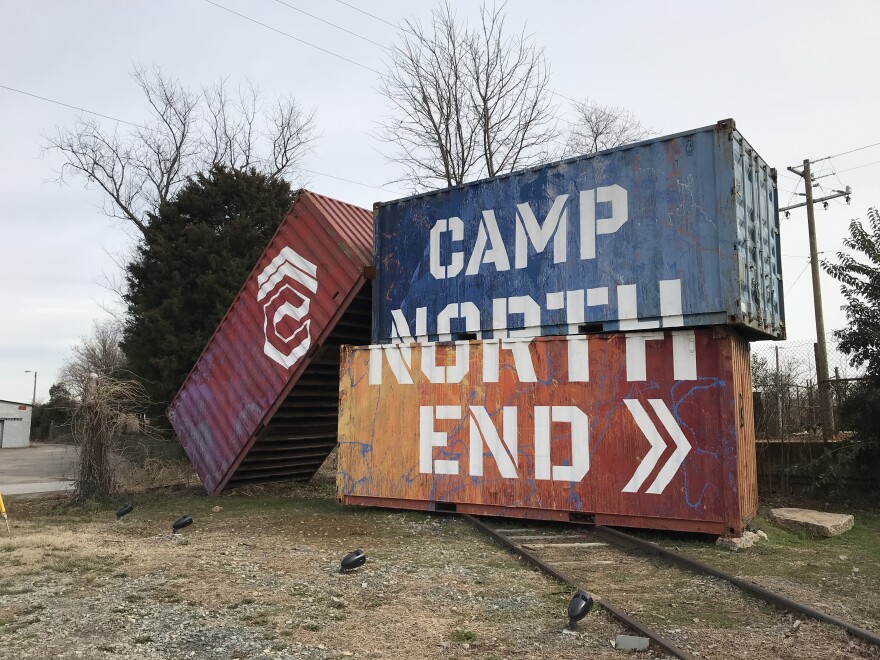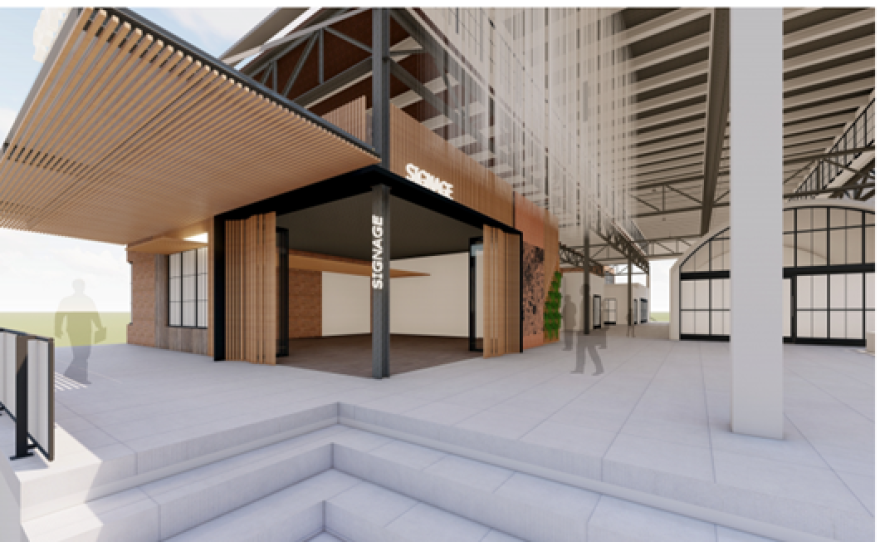Skyscrapers. High-rise apartment buildings. Announcements about corporate headquarters moving in. It’s easy to focus on what’s new in Charlotte.
So easy, in fact, that sometimes the city’s history can sometimes get drowned out by the rush to the future.
Camp North End is one of several sites across the city going in a different direction. To a degree, it’s new. And it’s certainly hip. But it’s also old, a former industrial complex in the shadow of uptown now teeming with food stalls, art studios and gathering spaces. The reclamation project doesn’t shy from its manufacturing past, with elements of its history proudly displayed.
Now part of its next expansion, which includes the redevelopment of a 35,000-square-foot office building on Keswick Avenue, will feature contest-winning designs from four local Black architects.
The contest, by Camp North End developer ATCO Properties & Management, specifically reached out to Black designers. The winners’ designs will be featured in four of seven pavilions in the area, called the Keswick Platform, that could be used for retail or food and beverage businesses. The four winners’ projects were selected out of 24 portfolio submissions. The 10 finalists were given $1,000 and the top four an additional $2,000.
Marcus Thomas was one of the winners. He’s managing principal at KEi Architects, and he says he wanted his design to speak to Charlotte’s Black history.

“Charlotte, as many metropolitan areas across the country, has a history of erasure when it comes to Black history,” Thomas said.
is design features a map, etched on reclaimed metal, that shows uptown Charlotte. But, just like the modern Charlotte depicted on the map, there’s more to the story. LED lights would illuminate buildings — current and gone — important to African American history.
“A perfect example is Bank of America Stadium,” Thomas said. “Bank of America Stadium now stands where the Good Samaritan Hospital once used to be, and I think it is important for people to recognize Charlotte's history and pay homage to those structures, architecturally, that represented the African American community for a long, long time.”
His design also nods to African huts, making use of reclaimed wood and plants.
“We become set and satisfied with the current stylistic nature of contemporary, modern, traditional architecture,” Thomas said. “Those words mean something different in other countries, and I think it's important to reach back and kind of bring some of those elements over into the country to help diversify what architecture really means.”
Diversifying architecture is also something that Melanie Reddrick, a Camp North End design winner and project architect at Little Diversified Architectural Consulting, says is vital. Not only in terms of diversifying the kinds of designs that are out there, but also in the study of architecture.

“As we were going to architecture school and learning architectural history in terms of what we looked at, it was all kind of Western European art and architecture,” said Reddrick, who also teaches part time at UNC Charlotte. “And that's what we study, and that's what we learned, and that's what we began to produce when we left school. … That's why a lot of the things that we see produced kind of look the same — because they're coming from the same historical precedents.”
Only about 2-3% of the nation’s registered architects are Black, according to the National Council of Architectural Registration Boards. The representation is even smaller for Black female architects.
“We just hit 500 licensed African American women (architects) in the United States,” Reddrick said. “I mean, I had 500 people in my graduating class at West Charlotte High School. So, basically, it’s just the size of my graduating class — my peers as Black female architects in this country. And that’s a problem.”
Reddrick’s concept, like Thomas’, also plays up history. Using Sanborn maps -- which documented Charlotte and other American cities in the 19th and 20th centuries -- as a guide, she envisioned a facade that depicts streets in the area in metal cutting through wood. The larger channels represent major streets, like Tryon, and the smaller ones, offshoots. Plywood signs show the names of former streets.
She lives in the area and notes how streets that have been swallowed up or renamed are remembered by residents but aren’t necessarily marked by plaques or other means of recording their existence.
“They can capture and memorialize some of these names that are lost to history,” Reddrick said. “... In my own way, this design is a way to kind of create a marker for those place names.”
Hasheem Halim’s design, meanwhile, helps tell the story of Camp North End, itself. At various times, the site was home to a Ford assembly plant, an Army quartermaster depot, a missile-production operation and a pharmacy distribution center.

Halim, who just launched a creative workshop and studio called Saturn Atelier, incorporates the chevron seen on the site’s grounds into the entryway and uses railroad ties to represent the importance of train access to the site’s uses over the decades. And he also worked in a nod to the site’s redevelopment efforts, too.
“I wanted to use recycled plastic for the facade to show that, hey, you can recycle,” Halim said. “Just as Camp North End’s recycling the factory, you can recycle something that seems like discarded waste — that is, plastic jugs or plastic bags — and turn them into plastic tile.”
Halim says another reason it’s important to showcase Charlotte’s history — and the diversity of it — is because so many people move here from other areas.
“It's a city full of transplants, and it's hard to kind of know what Charlotte stands for when you have so many competing influences,” Halim said. “The history of Charlotte is so rich, it's so right in your face. It's so easy to miss.”
Camp North End’s modern feel was a big inspiration for Aleah Pullen, the 2020 UNC Charlotte grad and architectural designer at Apogee Consulting Group who rounds out the four winners. Pullen’s design features wide windows, a sprawling mural wall that, like metal panels she included, tenants can paint as they see fit.

She visited the site for the first time after deciding to enter the competition and was enthralled by seeing people dancing, walking around and even watching a choir perform.
“I wanted to make my design very easily customized, so you could get a neon pink or something,” Pullen said. “Anything can happen in that space, and that would draw people in.”
Pullen, who has finished school but is still working on her license requirements, said she was excited to see that the contest was open to non-licensed architects in addition to specifically looking for Black applicants. She says inclusion in projects like this is one thing, but there needs to be more representation across media, too.
“In movies or publications that you see, an architect is usually an older white male or a white female, and you don't see people of color in those roles,” Pullen said. “It's just really helpful to see people of many different shades and backgrounds coming together.”
And Thomas, the architect from KEi, said competitions like this are a start.
“My hope as a participant and winner is that this will help foster the growth of diversity in the field and making sure that African American architects, designers, developers and everybody in that architecture-engineering-construction industry recognizes the importance of diversity and inclusion,” he said.









